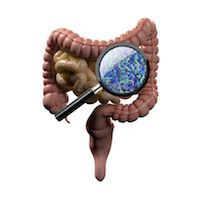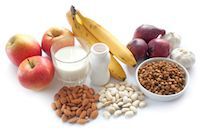¿Qué son los Probióticos?

Los probióticos son bacterias o levaduras “buenas” que refuerzan nuestra salud. Muchos de estos organismos son parte de un sistema digestivo saludable (el microbioma). Los probióticos se pueden encontrar en alimentos fermentados como el yogur, el chucrut, la kombucha, y como suplementos.
¿Por qué tomar probióticos?
La gente toma probióticos por muchas razones. Algunas razones están respaldadas por la ciencia. Otras, por ahora son solo teorías. Todavía tenemos mucho que aprender. Aquí hay algunas razones demostradas por la ciencia para tomar ciertos probióticos:
- Para prevenir la diarrea asociada con los antibióticos o infecciones
- Para el síndrome del intestino irritable: para ayudar con el dolor y la hinchazón abdominal
- Para prevenir o tratar el eccema
- Para prevenir el resfriado común y la gripe, y disminuir los síntomas
¿Cómo actúan los probióticos?
Creemos que es posible que los probióticos puedan actuar al sustituir las bacterias, levaduras y parásitos “malignos” en el cuerpo con bacterias y levaduras “buenas”. O los probióticos pueden estimular a nuestro sistema inmunológico para estar alerta ante las amenazas.
¿Son seguros los probióticos?

Para las personas sanas, tomar probióticos es seguro. Sin embargo, algunas personas con sistemas inmunes muy débiles podrían enfermar gravemente. Los suplementos no están controlados por la FDA. Esto significa que se desconoce la calidad, y la información en el contenedor a menudo no está respaldada por la investigación. Hable con un profesional de la salud sobre qué tipo de probiótico podría ser mejor para usted.
¿Cuánto debo tomar?
Todavía hay mucho que aprender sobre los probióticos, como qué se debe tomar para ciertas enfermedades y en qué dosis. Algunos consejos generales sobre los probióticos:
- Muchos alimentos son probióticos por naturaleza. Si bien estos alimentos son parte de una dieta saludable, puede ser que una porción no tenga la dosis suficiente para aliviar una enfermedad. Ese puede ser el momento de considerar un suplemento.
- Pruebe: yogures cultivados, kefir, salmueras fermentadas y chucrut, kimchi, kombucha y otros alimentos fermentados.
- Si usa un suplemento, asegúrese de averiguar qué cepa es mejor para su dolencia o enfermedad.
- Por lo general, se requiere una dosis de, al menos, 5 a 10 mil millones de CFU (unidades formadoras de colonias) por día para ver resultados.
- Asegúrese de comprobar si el probiótico que compra debe ser refrigerado. Algunos productos de alta calidad lo necesitan, pero otros no.
- Guarde los suplementos en un lugar fresco, oscuro y seco.
- Si toma probióticos para evitar la diarrea de los antibióticos, asegúrese de comenzar 2 o 3 días después de empezar la medicación. Continúe tomando los probióticos durante una semana después de terminar el medicamento.
- Es seguro para los niños tomar probióticos de calidad diariamente durante la temporada de gripe y frío. Esto ha demostrado que disminuye la duración de las infecciones respiratorias e intestinales.
- Considere llevar un probiótico en su próximo viaje al extranjero para evitar la diarrea del viajero. Empiece a tomarlo antes de llegar, y continúe tomándolo todos los días de su viaje.
¿Qué pasa con las marcas?
Hay muchas marcas de probióticos. Consulte aquí una lista de probióticos clasificados por calidad, seguridad y precio: https://labdoor.com/rankings/probiotics
Print Version
References/Resources
MORE INFORMATION:
Mayo Clinic National Center for Complementary and Integrative Medicine
REFERENCES:
Alipour B, Homayouni-Rad A, Vaghef-Mehrabany E, Sharif SK, Vaghef-Meharbany L, Asghari-Jafarabadi M, et al. Effects of Lactobacillus casei supplementation on disease activity and inflammatory cytokines in rheumatoid arthritis patients: a randomized double-blind clinical trial. Int J Rhem Dis. 2014 Jun;17(5):519-27. Doi: 10.1111/1756-185X.12333.
Bruzzese E, Fedele MC, Bruzzese D, Viscovo S, Giannattasio A, Mandato C, et al. Randomised clinical trial: a Lactobacillus GG and micronutrient-containing mixture is effective in reducing nosocomial infections in children, vs. placebo. Aliment Pharmacol Ther. 2016 Sep;44(6):568-75. Doi:10.1111/apt.13740.
Costa DJ, Marteau P, Amouyal M, Poulsen LK, Hamelmann E, Cazaubiel M, et al. Efficacy and safety of the probiotic Lactobacillus paracasei LP-33 in allergic rhinitis: a double-blind, randomized, placebo-controlled trial (GA2LEN Study). Eur J Clin Nutr. 2014 May;68(5):602-7. Doi: 10.1038/ejcn.2014.13.
Derikx LA, Dieleman LA, Hoentjen F. Probiotics and prebiotics in ulcerative colitis. Best Pract Res Clin Gastroenterol. 2016 Feb;30(1):55-71. Doi:10.1016/j.bpg.2016.02.005.
Didari T, Solki S, Mozaffari S, Nikfar S, Abdollahi M. A systematic review of the safety of probiotics. Expert Opin Drug Saf. 2014 Feb;13(2):227-39. Doi: 10.1517/14740338.2014.872627.
Didari T, Mozaffari S, Nikfar S, Abdollahi M. Effectiveness of probiotics in irritable bowel syndrome: Updated systematic review with meta-analysis. World J Gastroenterol. 2015 Mar 14;21(10):3072-84. Doi: 10.3748/wjg.v21.i10.3072.
Du YQ, Su T, Fan JG, Lu YX, Zheng P, Li XH, et al. Adjuvant probiotics improve the eradication effect of triple therapy for Helicobacter pylori infection. World J Gastroenterol. 2012 Nov 21;18(43):6302-7/ Doi: 10.3748/wjg.v18.i43.6302.
Fuentes MC, Lajo T, Carrion JM, Cune J. Cholesterol-lowering efficacy of Lactobacillus plantarum CECT 7527, 7528 amd 7529 in hypercholesterolaemic adults. Br J Nutr. 2013 May 28;109(10):1866-72. Doi:10.1017-S000711451200373X.
Goldenberg JZ, Lytvyn L, Steurich J, Parkin P, Mahant S, Johnston BC. Probiotics for the prevention of pediatric antibiotic-associated diarrhea. Cochrane Database Syst Rev. 2015 Dec 22;(12):CD004827. Doi:10.1002/14651858.CD004827.pub4.
Hilton E, Kolakowski P, Singer C, Smith M. Efficacy of Lactobacillus GG as a diarrheal preventive in travelers. J Travel Med. 1997 Mar 1;4(1):41-43. PMID: 98154765.
Jones ML, Martoni CJ, Prakash S. Cholesterol lowering and inhibition of sterol absorption by Lactobacillus reuteri NCIMB 30242L a randomized controlled trial. Eur J Clin Nutr. 2012 Nov;66(11):1234-41. Doi:10.1038/ejcn.2012.126.
Lau CS, Ward A, Chamberlain RS. Probiotics improve the efficacy of standard triple therapy in the eradication of helicobacter pylori: a meta-analysis. Infect Drug Resist. 2016 Dec 7;9:275-289. Doi:10.2147/DR.S117886.
Leyer GJ, Li S, Mubasher ME, Reifer C, Ouwehand AC. Probiotic effects on cold and influenza-like symptom incidence and duration in children. Pediatrics. 2009 Aug;124(2):e172-9. Doi:10.1543/peds.2008-2666.
Lue KH, Sun HL, Lu KH, Ku MS, Shen JN, Chan CH, Wang YH. A trial of adding Lactobacillus johnsonii EM1 to levocetirizine for treatment of perennial allergic rhinitis in children aged 7-12 years. Int J Pediatr Otorhinolaryngol. 2012 Jul;76(7):994-1001. Doi: 10.1016/j.ijporl.2012.03.018.
McFarland LV. Meta-analysis of probiotics for the prevention of traveler's diarrhea. Travel Med Infect Dis. 2007 Mar;5(2):97-105. Doi: 10.1016/j.tmaid.2005.10.003.
Mousa HA. Prevention and treatment of influenza, influenza-like illness, and common cold by herbal, complementary, and natural therapies. J Evid Based Complementary Altern Med. 2017 Jan;22(1):166-74. Doi: 10.1177/2156587216641831.
Ortiz-Lucas M, Tobias A, Saz P, Sebastian JJ. Effect of probiotic species on irritable bowel syndrome symptoms: a bring up to date meta-analysis. Rev Esp Enferm Dig. 2013 Jan;105(1):19-36. PMID: 23548007.
Pedersen N, Andersen NN, Vegh Z, Jensen L, Ankersen DV, Felding M, et al. Ehealth: low FODMAP diet vs Lactobacillus rhamnosus GG in irritable bowel syndrome. World J Gastroenterol. 2014 Nov 21;20(43):16215-26. Doi:10.3748/wjg.v20.i43.16215.
Pelucchi C, Chatenoud L, Turati F, Galeone C, Moja L, Bach JF, et al. Probiotics supplementation during pregnancy or infancy for the prevention of atopic dermatitis: a meta-analysis. Epidemiology. 2012 May;23(3):402-14. Doi:10.1097/EDE.0b013e31824d5da2.
Recine N, Palma E, Domenici L, Giorgini M, Imperiale L, Sassu C, et al. Restoring vaginal microbiota: biological control of bacterial vaginosis. A prospective case-control study using Lactobacillus rhamnosus BMX 54 as adjuvant treatment against bacterial vaginosis. Arch Gynecol Obstet. 2016 Jan;293(1):101-7. Doi: 10.1007/s00404-015-3810-2.
Szajewska H, Kolodziej M. Systematic review with meta-analysis: Saccharomyces boulardii in the prevention of antibiotic-associated diarrhoea. Aliment Pharmacol Ther. 2015 Oct;42(7):793-801. Doi: 10.1111/apt.13344.
Urbanska M, Gieruszczak-Bialek D, Szajewska H. Systematic review with meta-analysis: lactobacillus reuteri DSM 17938 for diarrhoeal diseases in children. Aliment Pharmacol Ther. 2016 May;43(10):1025-34. Doi: 10.1111/apt.13590.
Wang IJ, Wang JY. Children with atopic dermatitis show clinical improvement after Lactobacillus exposure. Clin Exp Allergy. 2015 Apr;45(4):779-87. Doi:10.1111/cea.12489.
Wu YJ, Wu WF, Hung CW, Ku KS, Liao PF, Sun HL, et al. Evaluation of efficacy and safety of Lactobacillus rhamnosus in children aged 4-48 months with atopic dermatitis: an 8-week, double-blind, randomized, placebo-controlled study. J Microbiol Immunol Infect. 2015 Nov 27.Pii:S1684-1182(15)00898-1. Doi:10.1016/j.jmii.2015.10.003.
Ya W, Reifer C, Miller LE. Efficacy of vaginal probiotic capsules for recurrent bacterial vaginosis: a double-blind, randomized, placebo-controlled study. Am J Obstet Gynecol. 2010 Aug;203(2):120.e1-6. Doi:10.1016/j.ajog.2010.05.023.
Yoon JS, Sohn W, Lee OY, Lee SP, Jun DW, Lee HL, et al. Effect of multispecies probiotics on irritable bowel syndrome: a randomized, double-blind, placebo-controlled trial. J Gastroenterol Hepatol. 2014 Jan;29(1):52-9. Doi:10.111/jgh.12322.
Zhang Y, Li L, Guo C, Mu D, Feng B, Xuo X, Li Y. Effects of probiotic type, dose and treatment duration on irritable bowel syndrome diagnosed by Rome III criteria: a meta-analysis. BMC Gastroenterol. 2016 Jun 13;16(1):62. Doi: 10.1186/s12876-016-0470-z.
Patient Education Materials
- Acupuncture
- ADHD
- Allergic Rhinitis
- Anxiety
- Aromatherapy
- Asthma
- Autism
- Back Pain
- Biofeedback Therapy/Training
- Breathing Techniques
- Cancer Symptoms
- Chiropractic
- Constipation
- Depression
- Diabetes
- Dyslipidemia
- Eczema
- Elimination Diet
- Fibromyalgia
- GERD
- Headache
- Healthy Diet
- Healthy Weight / Obesity
- Heart Disease
- High Blood Pressure
- Inflammatory Bowel Disease
- Insomnia
- Irritable Bowel Syndrome (IBS)
- Massage Therapy
- Meditation
- Menopause
- Menstrual Disorders
- Osteoarthritis
- Physical Activity
- Probiotics
- Progressive Muscle Relaxation
- Rheumatoid Arthritis
- Supplements
- Tai Chi
- Yoga